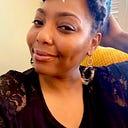Member-only story
What No One Tells Black Women About Heart Disease
The signs and symptoms show up differently in our bodies
I thought I was having an asthma attack when I visited my primary care physician in May 2019. By the time I left that appointment, I’d been referred to a cardiologist to have an echocardiogram (or heart ultrasound) to figure out exactly what was happening. Within two weeks, I’d been diagnosed with cardiomyopathy — better known as heart failure — put on a strict sodium and liquid restriction, and prescribed a cocktail of medications designed to both slow my heart down and make it beat more normally. By the time I was diagnosed, my ejection fraction (EF) — the amount of blood the left ventricle pumps with each contraction — was 16%; an ordinary EF is between 50% and 70%, according to the American Heart Association (AHA). I was 29.
I knew I’d been more short winded than usual, but I’d attributed it to anxiety and lack of consistent physical activity. I was also more tired than I’d ever been, but I thought it was due to juggling a full-time job, two book deadlines, and an iron deficiency. Had a doctor not considered a holistic picture of my symptoms, I likely would’ve died.
That’s seemingly the case for a generation of Black women being diagnosed with heart diseases in their twenties through forties. In a 2019 article…

